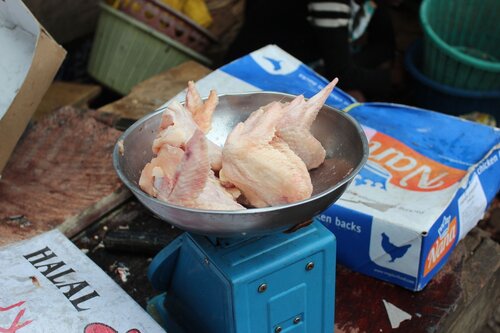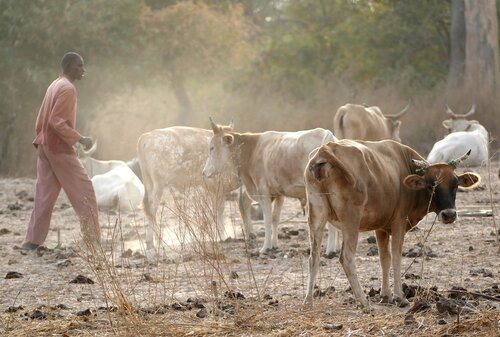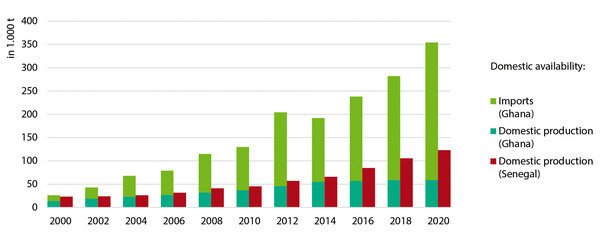Expertise
Europe's poultry and dairy exports to West Africa
Janine Pelikan, Claus Deblitz | 28.07.2023
Exports of poultry and dairy products from Europe to Africa have been criticized for years. Using the West African countries of Ghana and Senegal as examples, the Thünen Institute has investigated how imported products affect local consumption and local production.

Media reports and non-governmental organizations repeatedly point out the negative impact of EU exports on African countries. For example, while mainly chicken breast is consumed in the EU, wings and thighs are exported to West Africa. Here these products are offered at low prices and destroy the markets there - so the accusation.
In order to examine the effects of European agricultural exports in greater depth, the Thünen Institute selected two product groups and two countries as examples in the IMMPEX project: Poultry and dairy products as well as Ghana and Senegal. In both countries, the question was how imported products affect local consumption and local production.
The interviews and data collection were conducted in collaboration with local research institutes. The entire value chain was included, as well as the agricultural and trade policy framework. The results were discussed with stakeholders in Ghana and Senegal, and policy recommendations were jointly derived.
Results for chicken meat
Ghana and Senegal regulate imports of chicken meat, but use different measures: While Ghana imposes a 35% tariff, Senegal imposed a complete ban on imports in 2006 as a result of avian influenza, which remains in place today. Consequently, the sectors of both countries have been able to develop under different levels of external protection.
Within 10 years, production has nearly doubled in Ghana and nearly tripled in Senegal. Since Ghana additionally imports poultry meat, only about 20 % of consumption is covered by its own production. The rest is imported. Increases in production and imports allow Ghana to have a per capita consumption that is more than double that of Senegal.
The research showed that consumers in both countries have a preference for their local products. They perceive them as "fresh" and "tasty" and are willing to pay more for them if they can afford it. According to this, one might ask: What is the problem anyway? Production is increasing, consumers have a preference for local products, and in Ghana people have the opportunity to buy in an extra market segment at low prices or "convenient".
Trade policy recommendations
There is no doubt that production in Africa could develop better if it were not exposed to very low-priced competition from Europe. Therefore, there is a demand to limit or even completely stop our "cheap exports" to these countries. However, a unilateral export ban by the EU would hardly help the African farms, but would only lead to a diversion of trade. Chicken parts would then no longer come from the EU, but from the USA or Brazil. Trade policy measures would therefore be better applied at the external borders of African countries.
Would an import ban like the one in Senegal also be advisable for Ghana? Using model calculations, the research project showed that Ghana's domestic production would increase by up to 250 %. The other side of the coin is that prices would rise and, overall, consumption would be significantly lower. In addition, a ban on imports would eliminate tariff revenues, which account for a large share of total tariff revenues in Ghana. Overall, welfare would be reduced.
If the policy objective is to increase domestic production, importing countries should increase their tariff rate until they achieve the desired balance between boosting domestic production on the one hand, and avoiding excessive burdens on households on the other. Ghana could take advantage of this. The provisions of the World Trade Organization permit substantial tariff increases here, so that domestic production - according to the project results - could be increased by up to 100%. However, the situation in Senegal is different. Here, international regulations only allow a maximum tariff of 30%. Lifting the import ban would therefore place a considerable burden on domestic production in this country.
A key conclusion for our policy makers is therefore that they should work for a change in the international trade policy framework. Countries should be allowed to make their tariffs more flexible to allow a gradual opening of markets without collapsing local production. Alternatively or complementarily, countries should be able to use tariff rate quotas, i.e., a limit on the amount of imports allowed into the country at relatively low tariff rates.
Another important finding of the study is that in the West African countries, large domestic farms benefit significantly more from restrictive import policies than smaller or medium-sized farms. Thus, to the extent that governments wanted to address the differences between smaller and larger farms in addition to increasing domestic production, they would need to adopt structural policies in combination with trade policies.
Different conclusions for dairy products?

These basic assessments also apply for dairy products. However, it is unlikely that Senegal in particular will make use of the option of a more restrictive import policy. Here, feed quality, animal health, animal genetics and especially access to water are limiting factors for increasing production. The water needed for milk production includes both drinking water for cows and water for feed production. Senegal already suffers from water shortages, and increasing domestic production would require more water resources.
With a "true cost" approach, the bottom line might be that it makes more sense to rely on imports from the EU rather than on domestic expansion. However, we should also leave these decisions to the actors in the countries and not blame either the importing countries or our export industry if trade flows do occur in the end.
Download service
- Wissenschaft erleben 2023/1The article on page 10/11 (in German)
- Impact of Meat and Dairy Exports on Developing CountriesBrochure on the final workshop of the IMMPEX project







